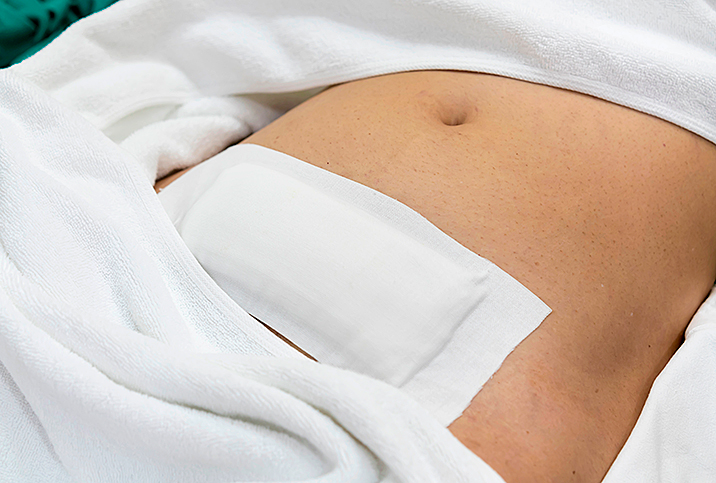You Might Not Need Pap Smears After a Total Hysterectomy

The Papanicolau smear test, commonly referred to as a Pap smear, has been used as a cancer screening test since the 1940s. It involves the removal of cells from a woman's cervix for culturing and examination, and has been instrumental in significantly decreasing the number of deaths from cervical cancer.
Pap smears are a regular part of many women's annual physical examinations, but what about women who have had their reproductive organs, including their cervix, removed?
Well, the answer is a little more complicated than you might expect.
The current numbers
Since 1996, the U.S. Preventive Services Task Force has stated that routine Pap smears are no longer required, let alone necessary, for women who underwent either partial or full hysterectomies for a benign disorder or disease.
"For people that have a total hysterectomy [removal of the uterus and cervix] for benign indications such as fibroids, abnormal bleeding or pain, we generally do not recommend they continue to have Pap smears done," said Elizabeth Campbell, M.D., assistant clinical professor of obstetrics and gynecology at University of Michigan Health in Ann Arbor. "They no longer have a cervix, which eliminates the chance of cervical cancer, and the incidence of vaginal cancer is extremely low."
Despite the formal recommendation, many women still go for routine cervical screening post-hysterectomy.
In 1992, before the task force recommendations, more than two-thirds of women in the United States who had undergone a hysterectomy reported having had a Pap smear within the previous three years, according to a 2004 report published in the Journal of the American Medical Association (JAMA). While those numbers have decreased since then, 2010 statistics indicated 58.7 percent of women who had undergone hysterectomy were still getting Pap smears.
Breaking down the recommendation
If you're 65 or older, you're likely exempt from Pap smears. Regardless of whether you've had a hysterectomy of any kind, routine Pap test screening is no longer required after age 65, stated Los Angeles OB-GYN Sarah Yamaguchi, M.D.
Anyone who received a total hysterectomy due to relatively benign conditions is also exempt from getting another Pap smear. This covers women who were diagnosed with fibroids, endometriosis or even ovarian or uterine torsion.
But even this guideline has a caveat: it applies only if you have consistently received normal or negative results during your routine Pap smear and you aren't at high risk for cervical cancer or other cancers of the reproductive system.
Previously diagnosed with reproductive cancer
If the hysterectomy was prescribed because of any form of reproductive cancer—cervical, endometrial, ovarian or uterine—then the physician may require the patient to continue to get Pap smears to monitor for potential recurrence.
"If you have had severely abnormal cells of the cervix or cervical cancer in the past, then there could still be some remnants that are left, which is why for those patients, we are more careful," Yamaguchi said.
Under these circumstances, the doctor takes a cell sample from the patient's vagina because cervical cells are unavailable due to the absence of the cervix.
"People who have a hysterectomy performed for high-grade cervical dysplasia [CIN 2-3] or cervical cancer, or who have a history of these conditions in the past 25 years, remain at higher risk for vaginal cancer so should continue to have vaginal Pap smears performed after hysterectomy," Campbell agreed.
DES exposure
Another reason doctors may mandate a Pap smear after total hysterectomy is if the patient's mother took the drug diethylstilbestrol (DES), a form of synthetic estrogen, during her pregnancy.
Gynecologists have learned that exposure to DES in the womb significantly increases a woman's risk of developing cervical cancer, even in residual cells following a total hysterectomy. Women who may be prone to this risk are those born between 1940 and 1971, when the medication was prescribed to prevent miscarriages, premature labor and other potential pregnancy complications.
Pelvic exams are not Pap smears
Pap smears may no longer apply to you if you've had a hysterectomy, but pelvic exams are still necessary. After all, a Pap smear is just one element of the pelvic exam. It's easy to confuse the two, but while a Pap smear specifically looks for cancer in cervical cells, a pelvic exam is a physical exam of the pelvic region, which includes the labia, vagina, cervix, uterus and ovaries, according to Yamaguchi.
"We sometimes will also send additional tests for STIs like gonorrhea, chlamydia and Trichomonas," she said. "The physical exam can detect things like abnormal growths or infections."
Pelvic and breast exams should still be a part of a woman's wellness regimen even following the surgical procedure, Campbell confirmed.
"Routine pelvic exams are still important to evaluate for dermatologic changes, vulvar precancer or cancer, and to assess for other symptoms that people may not recognize," she said.


















